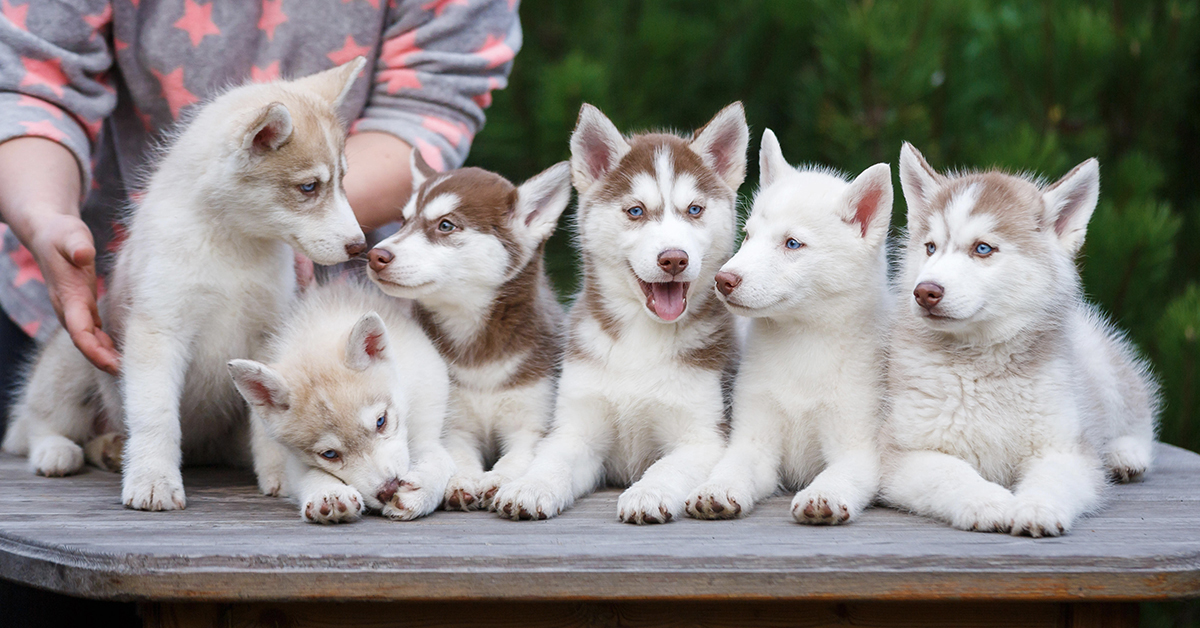



What pet breeders need to know about the latest COVID-19 advice
With the nation back in lockdown, how does the changing coronavirus guidance affect breeders? And how can you unite your animals with their new owners as safely as possible? Read on to make sure you're up to date!
With a new lockdown in place across the UK, and regulations frequently changing, it can be hard to keep up. So how can responsible breeders find the right homes for their animals and arrange safe pet handovers during the ongoing coronavirus restrictions?
We've reviewed the best resources and latest coronavirus guidance for breeders and here's everything you should know!
How to sell puppies and kittens safely during COVID-19
Since December 2020, the government guidance for England has advised would-be pet owners not to visit breeders in person to meet puppies and kittens with their mothers. Scotland, Wales and Northern Ireland have similar regulations in force. Instead, breeders should offer buyers a virtual tour to view prospective pets in their home environment.
It's still up to you, as a responsible breeder, to ensure that buyers are ready for a puppy or kitten and are able to provide a suitable 'forever home'.
And with new pets in high demand these days, your judgement is more important than ever.
If you have a litter due in lockdown, make the most of your phone, email and video to get to know potential owners and introduce them to your puppies or kittens.
In these difficult times, making sure your litters are covered is as important than ever. The Petplan Breeder Scheme offers support and rewards to breeders (plus a handy 4 weeks free insurance for your buyers). If you're not a member yet, why not join today?
Questions a responsible breeder should ask
Asking potential buyers the following will help you decide whether they're ready for 'pethood' in these challenging times:
- Are they ready to put in the time, money and affection required to care for the animal over many years (and even if their working situation changes)?
- Will they be around to train and socialise a young animal during what is a really important stage in its development?
- Can they offer the right environment - a suitable home and garden - for a young animal to thrive physically and emotionally?
You could also look at what animal charities like Dogs Trust are doing to adapt to the 'new normal'. Since mid-April, the charity has been asking would-be owners to fill out an online questionnaire about what they're looking for and their home circumstances, before spending time getting to know them over the phone.
If prospective owners can offer the right kind of home and attention, and are matched with a suitable dog, they initially 'meet' on an online video call.
This approach has enabled Dogs Trust to continue its rehoming work during lockdowns by matching some dogs with owners virtually, taking animals to meet their potential new family in an outdoor space (when restrictions have allowed), and delivering pets to owners, contact-free.
Planning COVID-safe pet collections
Remember that your legal obligations and licensing conditions as a breeder will still apply, even if routine veterinary services such as microchipping may have been disrupted during the COVID-19 pandemic. So plan ahead carefully for pet handovers.
Any paperwork should be completed and other checks carried out as far in advance as possible before handing over a new pet. As Jill Peak, a leading dog-show judge and breeder of Bayard Beagles, explains: 'It may seem like a lot of information and paperwork, but preparing some of the following in advance will make the handover smoother.'
One way to streamline the process of handing over a young animal to a new owner is to set up a puppy or kitten contract between you and the prospective owner.
This is a legal document that can cover everything from medical information to when payment is expected. A free puppy contract template is available from The Puppy Contract. If you're a kitten breeder, you can use the Kitten Checklist.
As well as a clear contract, new pet owners usually appreciate any advice and information you can offer them. So try to provide:
- Details of vaccinations, a vet's certificate and a microchip number (microchipping is a requirement before a puppy leaves a breeder);
- Insurance that starts straight away. By signing up to the Petplan Breeder Scheme you can activate 4 weeks free insurance when your puppies and kittens leave for their new homes;
- A worming chart;
- A registration certificate;
- A contract of sale (which might be part of that all-important puppy or kitten contract); and
- A guide to settling in, including a diet sheet, socialisation plan and details of any equipment that will be supplied.

How to deliver pets to new owners in lockdown
The latest government COVID-19 advice on pets state that you, as the breeder, should arrange to deliver your animals to their new owners when they're ready to be rehomed. Owners should only collect pets themselves when this isn't possible and the handover is necessary for the animal's welfare.
While work-related travel is still permitted, you must be sure that any journeys are absolutely necessary. All businesses are expected to have carried out a risk assessment for working safely during the COVID-19 pandemic. However, if your business includes fewer than five people (as is often the case with pet breeders), you do not need to write this down.
As the Scottish and Welsh governments have restricted travel between their countries and the rest of the UK, you'll need to check that any journeys comply with the relevant legislation.
Defra (the Department for Environment, Food & Rural Affairs) previously advised breeders to take decisions about whether animals can be safely handed over 'on a case-by-case basis'. Here are some golden rules:
Puppies or kittens shouldn't be taken to an infected or self-isolating household, or one where someone has coronavirus symptoms, so check that out in advance.
Pet handovers should take place without entering private dwellings, and those present should observe social distancing rules throughout.
If possible, avoid handing over any pet baskets, food, leads or other equipment. Sterilise any equipment that is handed over, and disinfect any surfaces that have come into contact with animals during transport.
What Lucy's Law means for breeders in lockdown
Coronavirus restrictions are not the only thing breeders are currently getting used to, of course. The much-anticipated legislation to protect puppies and kittens, known as Lucy's Law, came into effect in England on 6 April 2020. Wales and Scotland are both set to follow suit in 2021.
As Trevor Cooper, an expert in canine law, explains: 'Lucy's Law itself - the part that prevents underage puppies and kittens being sold by dealers - is in force, despite COVID-19.'
'The regulations were put in place to try to put an end to puppy farming. In England, anyone looking for a puppy or kitten under six months old must deal directly with a breeder or a rehoming centre.'
Our Petplan Breeder Charter helps us to ensure our breeders are compliant with the latest animal protection laws.
COVID-19 advice for pet owners and breeders
Bear in mind that coronavirus guidance for people with animals is updated regularly by the government, and laws differ in Scotland, Wales and Northern Ireland.
The CFSG (Canine and Feline Sector Group) also regularly updates its advice for pet businesses.
If you're already a Petplan Breeder Scheme member, log in to activate your free cover today.
Already a Petplan Breeder?
Sign in to your account

